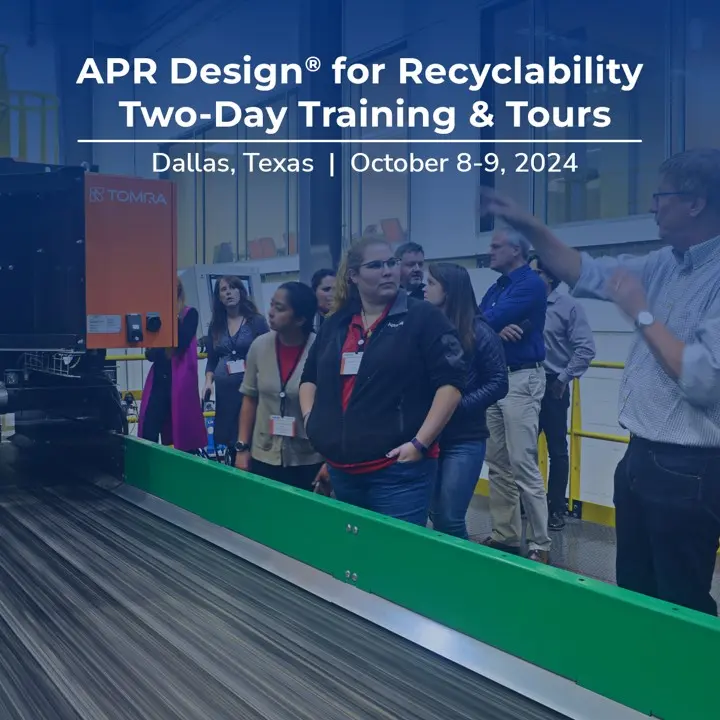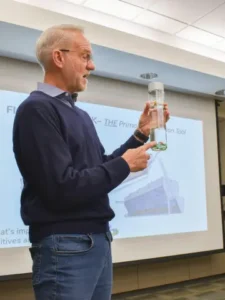APR Design® Announces Two-Day Training & Tours Program

Press release submitted on behalf of the Association of Plastic Recyclers.
Learn why and how to design for recyclability in this two-day interactive session. Both days start with classroom learning, covering what it means to be recyclable, how packaging makes it through the full North American recycling system, recommendations and watchouts for design, as well as recycling policy and economics updates. In the afternoons, see recycling in action and put the classroom learning to the test with field trips touring a materials recovery facility (MRF) on day one and a plastics recycler on day two. Ultimately, this program develops expertise and insights that attendees can then bring back to their companies and leverage to lead better packaging design.
Register Now Before Space Fills Up
Final Registration Deadline: Friday, August 30
- Two-day training session
- Two guided tours (Day 1: MRF, Day 2: Plastics Recycler)
- Transportation to and from recycling facilities
- Breakfast and lunch both days
- One evening networking reception
Who Is This For?
Package Design Engineers
Sustainability Managers
Product Managers
Marketing Managers
Procurement Managers
Why Attend?
Recycling is a complex process! Dive into the details with an expert and see the process first-hand for an invaluable experience that will guide all future packaging design discussions.
Develop plastics recycling expertise to meet voluntary and legislative requirements, improve the supply of high-quality PCR, and reduce plastic waste going to landfills.
Understand the intricacies of the APR Design® Guide for Plastics Recyclability, APR test methods, and recognition programs.
Experience an APR Design® Training at an entry-level price—great for small companies or larger companies that are thinking about scheduling a customized full-day session in the future.
Curt Cozart is Chief Operating Officer at APR, as well as president and owner of Common Sense Solutions, Inc., a consulting company specializing in plastics recycling plant design, project management, and operations. He has worked in the plastics recycling industry since 1991 when, as a project manager for Mobil Chemical Company, he built the first North American film recycling plant dedicated to LLDPE stretch film. Since that time, he has participated in the construction and operation of much of the North American PET, HDPE and film recycling industry. Curt holds a BS in mechanical engineering from The United States Military Academy at West Point.

Agenda
Tuesday, October 8
7:30 AM—Breakfast
8:00 AM—Training Begins
- Review of what it means to be “recyclable”
- APR overview (including connection to other North American and global organizations)
- Overview of the MRF recycling process, including watchouts and recommendations for success
- Update on recycling policy & economics
Noon—Lunch
12:30 PM—Shuttle Departs from Hilton
Travel to Waste Management (WM)
1923 Meridian Street
Arlington, TX 76011
1:00 PM—Tour of a Single-Stream MRF
3:30 PM—Shuttle back to Hilton
Wednesday, October 9
7:30 AM—Breakfast
8:00 AM—Training Resumes
- Overview of plastic recycling process
- Deep dive into specific packaging types
- How your company can use the APR Design® Guide & APR Design Recognition Program to create better packaging
12:30—Shuttle Departs from Hilton
Travel to Indorama Ventures Sustainable Recycling
4685 Mountain Creek Pkwy
Dallas, TX 75236
1:00—Tour of a PET Recycling Facility
3:30 PM—Conclusion & Shuttle Back to Hilton
About APR
The Association of Plastic Recyclers (APR), which was founded over 30 years ago by mechanical recyclers, is an international non-profit and the only North American organization focused exclusively on improving recycling for plastics. Our member base covers the entire recycling process—from design to collection to recovery to remanufacturing— because recycling is a highly interconnected system, and the success of each stage relies on what comes before and after it in the cycle. For more information, visit www.plasticsrecycling.org.